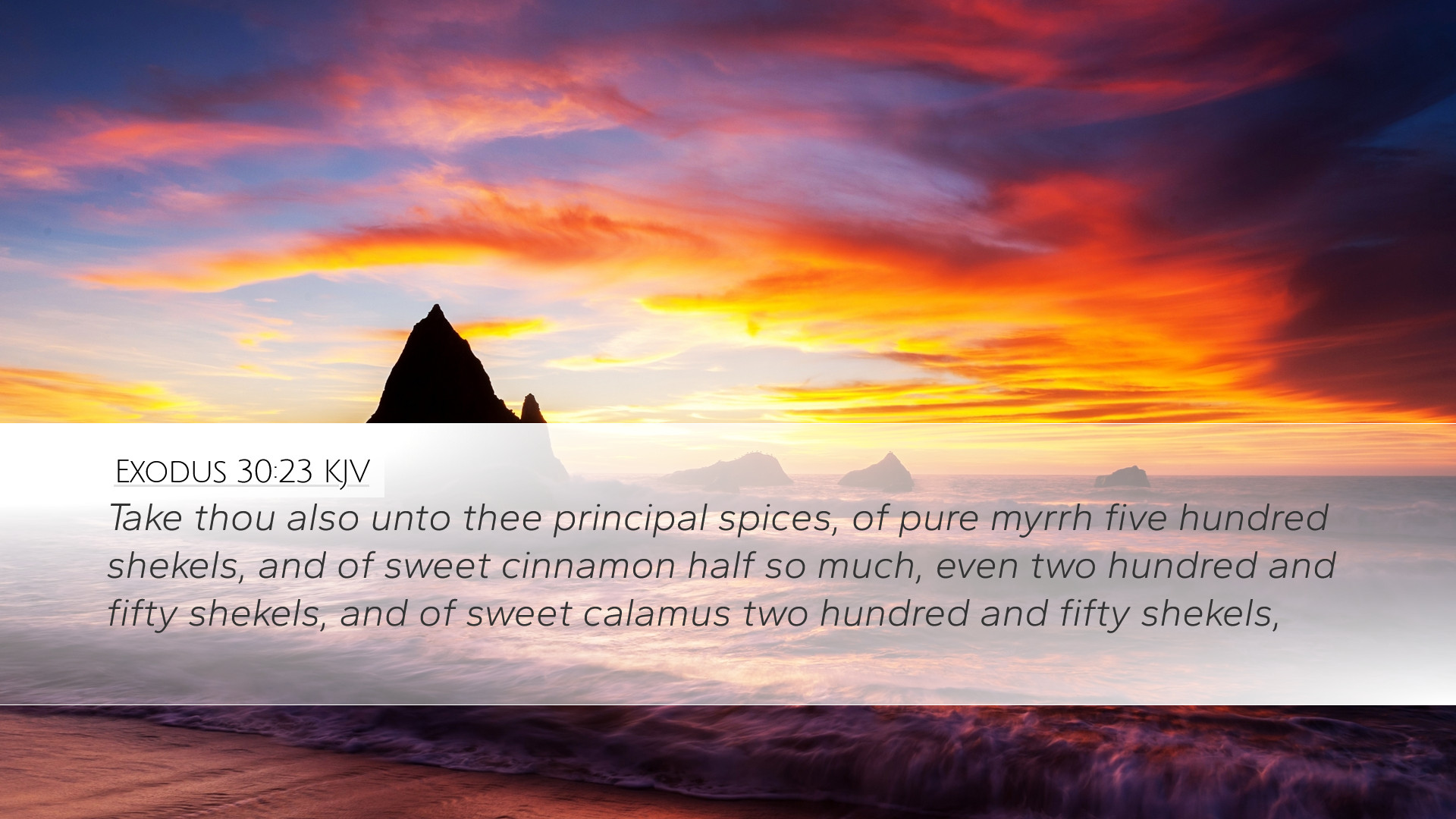Exodus 30:23 - A Commentary Summary
Exodus 30:23 states, "Take thou also unto thee principal spices, of pure myrrh five hundred shekels, and of sweet cinnamon half so much, even two hundred and fifty shekels, and of sweet calamus two hundred and fifty shekels."
Introduction
This verse is part of God’s instructions to Moses regarding the anointing oil and the sacred incense used in the Tabernacle. The detailed specifications reveal the importance of both the materials and their symbolism in worship and service to God.
Key Insights from Commentaries
1. The Significance of the Ingredients
The three ingredients mentioned—myrrh, cinnamon, and calamus—hold both practical and symbolic significance.
- Myrrh: Myrrh is a resin known for its fragrance and medicinal properties. Matthew Henry points out that myrrh often signifies suffering and sacrifice, reminding us of Christ's future suffering and the anointing that would occur at His burial.
- Cinnamon: Cinnamon, known for its sweet aroma, represents the pleasantness of worship and the attributes of God’s character. Albert Barnes emphasizes that its sweetness symbolizes the joys and gratifications that accompany a life devoted to God.
- Calamus: Calamus, a fragrant cane, symbolizes purity and uprightness. Adam Clarke notes that this ingredient reflects the integrity and moral purity that should accompany our worship and service.
2. The Measurement of the Ingredients
The specified measurements—five hundred shekels of myrrh and two hundred and fifty shekels each of cinnamon and calamus—indicate not only the value placed on these items but also their sufficiency for the holy uses they are designated for.
Matthew Henry suggests that the precise measurements symbolize God’s careful attention to detail and the importance of adhering to divine instructions in worship. This reflects a broader principle in Scripture that God desires worship that is done according to His specifications.
3. Application for Today’s Believers
These ingredients can serve as a metaphor for the believer's life and worship:
- Worship with Sacrifice: Just as myrrh signifies suffering, true worship may involve sacrificing our desires for God’s will, paralleling Romans 12:1 where believers are called to offer their bodies as living sacrifices.
- Embrace Sweetness in Life: Like cinnamon, our Christian walk should have a sweetness that draws others to Christ. This sweetness can manifest as joy, grace, and kindness in our interactions.
- Pursue Purity and Integrity: Calamus’ symbolism reminds Christians to live with integrity, reflecting the character of Christ in a world that often values self-interest above righteousness.
4. The Role of Anointing in Ministry
The process of mixing these ingredients to create anointing oil was a significant act in the consecration of priests and sacred objects.
Albert Barnes describes the anointing oil as a means by which God set apart leaders and instruments for His purposes. This ties into the New Testament understanding of anointing believers with the Holy Spirit, as highlighted in 1 John 2:20, where it states that believers have an anointing from the Holy One.
5. Theological Implications
The meticulous nature of the anointing oil's formulation serves as an illustration of God’s holiness and the seriousness of approaching Him with reverence.
Adam Clarke articulates that the careful preparation of the anointing oil points towards the need for holiness in worship. Just as oil is used to designate what is sacred, believers today are called to be holy as God is holy (1 Peter 1:16).
Conclusion
Exodus 30:23 presents a rich tapestry of themes surrounding worship, sacrifice, and holiness. By understanding the significance of the ingredients and their measurements, pastors, students, theologians, and Bible scholars can glean important insights into the nature of God and the call to lead a life marked by integrity and worship.


